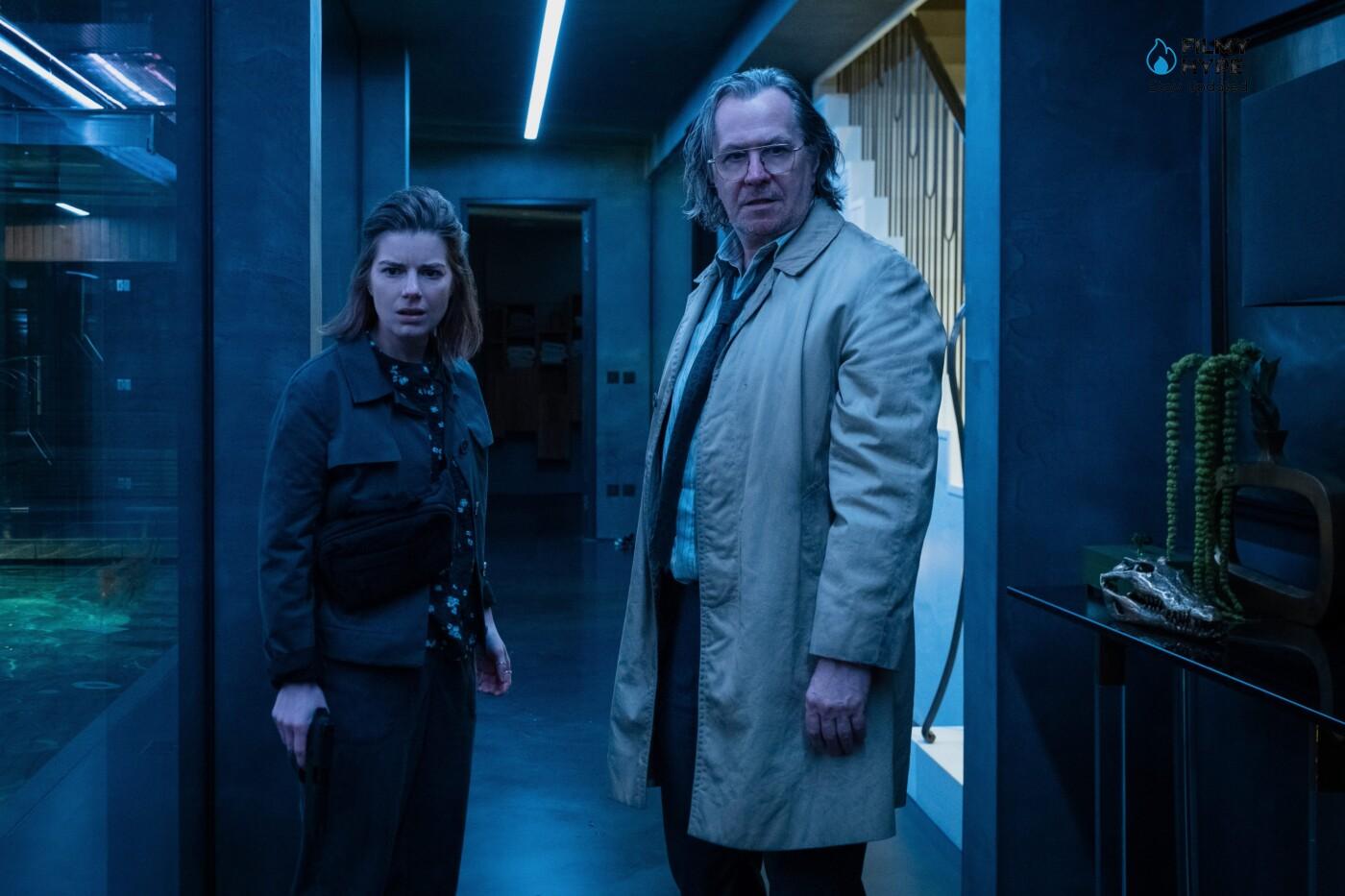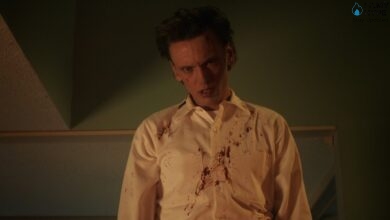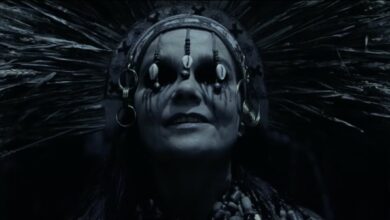Slow Horses Season 2 Ending Explained: In Detail – Why They Kill Min Harper? Lamb’s Note
Past and present intertwine in the dense final episode of Slow Horses Season 2, which not only concludes the new cycle of episodes of the series in the best way, based on the spy-thriller novels by Mick Herron but also sheds light on an old mystery so far unsolved. Given that several months passed between the two seasons of the excellent Apple Plus spy series, and there were objectively many knots to untie, before making an appointment in the second half of 2023 with the third narrative arc, we offer you an explanation of the ending of Slow Horses Season 2.

It’s not long until Slow Horses Season 2 arrives on Apple TV+. The show that this year explored a reality that is not at all conventional for the spy-thriller will return in December 2022 Apple releases. The ramshackle team of the Marsh, led by an impatient Gary Oldman, had made a good impression on us in our first look of Slow Horses, but the elements in our possession had not provided us with a complete picture of the situation. We can now say with some solidity that the Cupertino streaming platform series is another worthy addition to a catalog that, barring a few slip-ups, manages to win in terms of quality in almost every context. A few weeks ago, Gary Oldman announced his intention to leave the acting world. In all likelihood, the Apple TV+ spy series Slow Horses, based on the gripping novels of Mick Herron, will therefore be the last time we see the award-winning British actor, former star of Dracula, Leon, The Fifth Element, The Dark Knight and Darkest Hour.
Slow Horses Season 2: The Story Plot
The serial adaptation of Mick Herron’s novels, therefore, continues effortlessly: it is now the turn of the second novel in the series, Dead Lions, which however presents some variations compared to the transposition of the previous one. If the first season substantially distanced itself from the book only in the last episode, in the second the narrative framework differs more or less in the middle of the path and for two very specific reasons: first of all, it was necessary to give greater specific weight and room for maneuver to the “mind” of the Jackson Lamb group ( Gary Oldman ), who instead in the novel is more defiled: secondly, what happens in Herron’s story slowly turns into something enormous, larger than life, that it would have remained at least complex to think that it was solved only by Lamb’s agents. In this way, and it is a very rare case to occur, the adaptation turns out to be better than the original novel, or at least more consistent with the status and abilities of the characters.
An elderly Soho shopkeeper spots a man he thinks he recognizes outside his business, tails him, follows him to the station, and then suddenly dies of a heart attack on the seat of a bus after leaving a note on his cell phone. His name was Richard Bough, and he had once been a prominent British spy. For Regent’s Park and headmistress Taverner, the episode is “ exactly what it sounds like: the foretold death of an old drunkard ”. For the scruffy, dirty and arrogant Jackson Lamb, however, Bough was murdered, and behind the scenes, there are the infamous “Project Cicadas”, which the rest of the British intelligence has long since declassified to the rank of an urban legend.
According to some unconfirmed sources, some Soviet agents of the KGB were infiltrated into English society, and the sleeper cells survived even the fall of the wall: Alexander Popov, an elusive puppeteer with an unknown face, would have been pulling the strings. Meanwhile, Taverner’s young and presumptuous collaborator, James Webb, offers Min and Louisa a job: the two “nags” will have to deal with the security of a meeting between British intelligence and Arkady Pashkin, the right-hand man of the Russian oligarch in exile Ilya Nevsky. Last season’s hero, River Cartwright, on the other hand, hasn’t lost hope of escaping the despotism of Lamb and the House of the Marsh to become a real agent: his path, however, cannot go through job interviews, if no other reason because even in the private intelligence sector everyone knows the bad reputation of the “nags”. And so, the only hope will be to throw himself headlong on the trail of the Bough murder, in the hope of obtaining a serious assignment from Lamb…
Slow Horses Season 2 Ending Explained: Feints and Counterfeits
In the previous episode, after discovering the plans of the Russian sleeper cells, River had contacted Diana Taverner to invoke the activation of the “September Code” and evacuate the entire City of London, to prevent a British re-edition of the attack against the Towers Twins. The moment could not have been more miserable, since her call came in the middle of an important speech by Home Secretary Judd, in a closed London, between marches of demonstrators and massive police deployments. The alternatives, however, were scarce: the unsuspecting Alex Tropper was already in flight on his plane, he had left a note announcing his suicide to his daughter and her husband, and River had seen a homemade bomb ready to be loaded on the aircraft… Nothing to do: River has messed up again. The Russians deceived him, and the bomb remained on the ground!
The plan was to ridicule Jackson Lamb’s nags, and in the meantime create a diversion that would leave the field free for Pashkin and his henchmen to enter the Glasshouse skyscraper and transfer all the wealth belonging to the oligarch Nevsky to Moscow. Fortunately, River manages to prevent the British planes from shooting down Alex, while his colleagues Louisa and Marcus eliminate Pashkin, without however preventing him from emptying Nevsky’s accounts.
Who were the instigators? The sleeper cells have always been coordinated by Katinsky (the infamous Papov), who for over 25 years pretended to have betrayed the KGB, but kept the operation going. Katinsky had an old score to settle with Lamb, and he was the one who targeted the nags. The real mastermind of the plan, however, was the FSB, Putin’s intelligence: it was they who ordered Pashkin to eliminate the dissident Nevsky, and Katinsky to support him, reactivating his cicadas…
Why They Kill Min Harper?
Why did the Russians brutally murder poor Min Harper? After his quarrel with Louisa, the spy had glimpsed Pashkin in the wrong place and at the wrong time, namely in the same apartment where Chernitsky, the bald killer Jackson Lamb and his spies were investigating, was also present. Having sobered up on vodka and returned to base, Min could certainly have guessed that Pashkin was collaborating with an agent of the former KGB, and therefore he certainly could not be the right-hand man of a dissident oligarch in exile! Ultimately, the most brutal and traumatic twist of the second season was the result of a simple unfortunate circumstance, which forced Arkady Pashkin to order the killing of one of our favorites.
Lamb, Partner and Katinsky: An Old Score To Settle
But then, why involve Min and Louisa? And why leave a trail of clues that would lead River to Upshot, from where he would invoke the activation of “Code September”? Of course, the order to kill the dissident oligarch Nevsky and empty his accounts came from the FSB, but it was Nicolai Katinsky who repeatedly targeted Jackson Lamb’s nags. “I wanted the professional humiliation of you, and of your team,” he confesses. But for what reason? The unfinished business between Katinsky and Lamb dates back to the end of the Cold War, and connects directly to the final scene of the first season: on the orders of David Cartwright, River’s grandfather, Lamb assassinated the former director of Mi5, Charles Partner and staged his suicide.
The episode deeply marked the life of his wife Catherine Standish, who continues to ignore the incident. In reality, Partner was one of the Soviet agents coordinated by Katinsky, secretly passing British information to the KGB. Lamb’s brutality may have shocked us, but it had very specific reasons: years earlier, Partner had revealed to the Stasi (East Germany’s secret police) that the British spy infiltrated their ranks was a woman, and the girl, along with the only other two female officers, had been beheaded after brutal torture.
Lamb would have liked to kill Partner on the spot, but River’s grandfather adopted a more cunning tactic: for years, the two leaked false information to the head of Mi5, and he transmitted it to Katinsky and Russia, making the entirety lose credibility. project. Eventually, Partner met his death, and Katinsky fell into disgrace. For this reason, during the exciting finale, Katinsky sends his assassin Chernitsky to kill Carwright senior as well: River and Lamb arrive late, but David is a tough nut to crack, and easily eliminates his attacker.
Lamb’s Note (What Was In It?)
Finally, a curiosity: at the end of the series, Lamb has a plaque clandestinely installed in honor of Min Harper in the church of Saint Leonard, among the British agents who died with honor in the service of the country. Beyond appearances, the coordinator of the Casa del Pantano cares a lot about his agents and does not accept the refusal opposed to him by the icy Diana Taverner, who in the meantime is preparing to climb the ranks of Mi5 with the support of the future prime minister Judd. Poor Min thus gets the honor he deserves, although Lamb is certainly not able to make great speeches in his honor…
As everyone walks away, and Catherine turns a thought to the late Charles Partner, Lamb glues a post-it to the wall of the church, which falls to the ground shortly after: “Dickie Bow served behind the Wall. To Joe.” The message is dedicated to the memory of Dickie Bough, the former British spy murdered by Chernitsky at the beginning of the season. If the plates of all the other agents bear the inscription “served his country”, the memory of Dickie reads “served behind the Wall”. But what does “to Joe” mean? A “Joe”, in the jargon, is an undercover spy, infiltrated behind enemy lines. Since poor Dickie died on a bus like any drunk, Lamb would have liked to pay homage to him too, recalling that in the past he was still a valid secret agent in the service of her Majesty. The ticket, however, is short-lived…





